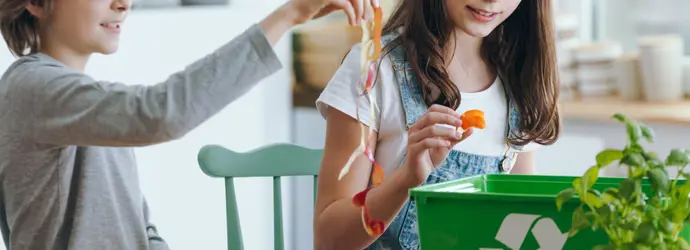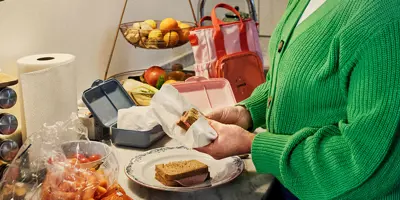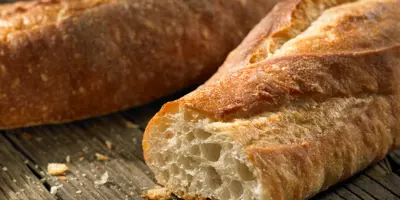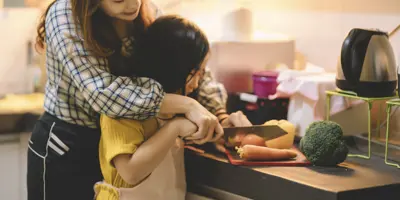
Midnight snacks, late night chats, lazy Sunday breakfasts; for better or for worse, the kitchen sees it all. Yes, even that trail of bin juice. The kitchen is also the place to reduce food waste and make a big difference in how sustainable we are at home. So how can food waste be reduced? And how can we stop food waste entirely, if possible?
We’ll show you how to prevent food waste and with a few easy tips, including clever planning and cooking, practice of composting, plus eco-friendly food storage and food prep. And remember: it’s not just up to you, it’s up to all of us, so implement whatever sustainable practice you can – even small actions and gestures help!
How can we reduce food waste with proper planning?
Like with most things, planning and preparation are the keys to success. The same is true for food waste prevention. Whipping up a delicious meal out of whatever’s left in the fridge is one of life’s great pleasures. If you’ve ever managed to eat an entire food shop without having to throw anything away, you’ll know how satisfying it is. If not, you’re in the right place to learn! Follow our step-by-step process to help stop food waste:
- Do a stock-check of your cupboards/fridge/freezer so you know what you have.
- Make a meal plan that uses food you already have in stock.
- Write a shopping list for the other items you’ll need for your meal plan.
- Only buy what you need.
Ways to reduce food waste with eco-friendly kitchen storage
Now you’ve planned your shopping list and know just how to make the most of every food item on it, but how can you continue with your goal of having an eco-friendly kitchen? By storing it in an environmentally friendly way, that’s how! That includes both how you store food and what you store it in:
- Store food with the closest expiry date at the front, so it’s used first.
- Freeze food that you know will go past its expiry date before you get the chance to use it.
- Learn how to store food correctly so that it keeps for as long as possible. For example, potatoes, onion and garlic should be stored in dry, dark places while apples, peppers and berries should be stored away from bananas and tomatoes, which produce ethylene gas that can spoil nearby foods.1
Tip
Do you have a new species forming in your vegetable drawer that once upon a time was the fresh basil lovingly sprinkled over last week’s lasagne? Thought so. To prevent wilting, loosely wrap your fresh herbs in a damp kitchen towel before refrigerating them in a sealed container or bag. Wrapping them will help stop the leaves from wilting and let them keep for longer!
How to prevent food waste with clever cooking
Food waste prevention continues with the way you cook it. Here are a few tips on how to ensure less food goes in the bin:
- Keep an eye on expiry dates and use fruit and veg that’s approaching theirs in soups and smoothies, which you can then freeze.
- Research recipes for leftovers so you can enjoy all of the food you have cooked, without extra portions going to waste.
- Use veg scraps (peels/stalks/ends) to make homemade stock or put them in the compost heap to make fertiliser for your garden. More on that below!
Ways to “reduce” food waste by repurposing for composting
While the tips mentioned above can significantly help to stop food waste and promote sustainability, there's another way to reduce the amount of food that’s thrown away that often gets overlooked: composting. Composting is a natural process that turns organic waste into nutrient-rich soil conditioner, known as compost, giving it a new purpose.2
By incorporating composting into your kitchen waste reduction mission, you can divert some food waste from landfills and help contribute to the environment.3 So, let’s roll up our sleeves, don our gardening gloves and dive head first into the dirty, earthy, worm-filled world of composting, how it works, and how you can implement it into your daily routine!
What is composting?
Composting is the process of decomposing organic materials, such as kitchen scraps and garden waste, through the action of microorganisms, fungi, and small insects. You may have seen an old wooden structure sitting seemingly idle at the back of a loved one’s garden. Well, that’s actually a hive of activity! Find out what composting means and how it works to learn the essentials!
Why compost your food waste?
When food waste ends up in landfills, it undergoes anaerobic decomposition due to the lack of oxygen.4 This process produces methane, a potent greenhouse gas that contributes to climate change. However, by composting your food waste, you can prevent the release of methane and instead harness the benefits of compost to enrich your garden or plants.5 That’s the science behind it – now time to learn how to do it!
How to give food waste a new life through composting
Composting is easy and can be done on a small scale, making it suitable for both homes and apartments. Here's how to reduce food waste by composting:
- Collect food scraps. Save your fruit and vegetable peels, coffee grounds, eggshells, tea leaves, and other plant-based food scraps in a compost bin or container. Avoid adding meat, dairy, and oily foods, as they can attract pests and slow down the composting process. Learn more about what you can and can’t compost.
- Choose a composting method. There are various composting methods to suit different lifestyles and spaces. Vermicomposting, using worms to break down food waste, is ideal for small living spaces. Tumblers and compost bins are perfect for backyards, while Bokashi composting works well in kitchens – some even come with filters to keep those rotten food smells contained, so it’ll only be the delicious scent of your cooking lingering in the kitchen!
- Add brown material. For successful composting, you need to balance the green food scraps with brown materials like dry leaves, straw, shredded newspaper, or cardboard. Brown materials provide carbon, which helps the composting process and prevents odours.
- Maintain the compost. Turn or mix the compost regularly to provide oxygen to the decomposers and ensure even breakdown. Keep the compost moist but not waterlogged.
- Harvest and use the compost. Depending on the composting method, your compost will be ready in a few weeks to several months. It can require a little patience, but which worthwhile things don’t? Trust us: it’s worth the wait. When it’s dark, crumbly, and smells earthy, you’re good to go! Incorporate the compost into your garden soil or use it as a nutrient-rich top dressing for your potted plants.
The benefits of composting to reduce food waste
Composting reduces the amount of organic waste sent to landfills, making a significant impact on reducing overall waste. As such, it’s a fantastic, fun and satisfying way to reduce your food waste. Composting offers a range of other benefits, too, including:
- Reduced methane emissions. By diverting food waste from landfills, composting helps lower greenhouse gas emissions, mitigating climate change.
- Enriched soil. Compost improves soil structure, fertility, and water retention, leading to healthier plants and higher yields in your garden.6
- Sustainable Gardening. Composting provides a sustainable alternative to synthetic fertilizers, promoting natural nutrient cycles and minimizing the use of chemical inputs.6
Tip
Did you know Plenty kitchen roll sheets can be composted? That’s right! You can now throw Plenty Original sheets into your compost bin! That’s compostable sheets* for compostable messes!
Want to know more about Plenty’s compostable kitchen roll sheets? Check out the answers to your frequently asked questions.
How can food waste be reduced with eco-friendly food prep
When preparing food, you can make smart product choices to help your food last longer. For example, using a sheet of kitchen towel to absorb any excess water in your salad drawer will help those leaves and veggies stay crisp and last longer. So no more soft vegetables that should be hard, and no more furry vegetables that should be smooth... Shudder.
You can also swap your plastic sponges for strong kitchen paper, to help remove grease and dirt from your chopping boards after prepping food on them.
When preparing food, you can make smart product choices to help your food last longer. For example, using a sheet of kitchen towel to absorb any excess water in your salad drawer will help those leaves and veggies stay crisp and last longer. So no more soft vegetables that should be hard, and no more furry vegetables that should be smooth... Shudder.
You can also swap your plastic sponges for strong kitchen paper, to help remove grease and dirt from your chopping boards after prepping food on them.
Tip
Plenty kitchen paper is super strong when wet, so you’ll find one sheet is often enough to tackle the big jobs.
Eco-friendly kitchen alternatives to plastic
Sustainability in the kitchen is becoming increasingly important as people become more aware of the environmental impact of using plastics. But let’s not kid ourselves, plastic is everywhere, and it’s prevalent in some very useful kitchen items. Luckily, there are many alternatives to plastics that you can try at home:
- Use refills of washing up liquid rather than buying a new bottle (and squeeze out every last drop). By reusing existing containers, you can minimise single-use plastic consumption effectively.
- Swap plastic bags for reusable canvas shopping bags when you buy groceries. These eco-friendly alternatives are sturdy, versatile, and can be used for multiple shopping trips, reducing plastic pollution and its impact on the environment. And hey, tote bags just look cooler!
- Swap pre-packed food in plastic containers for loose food items in paper bags. This small change in shopping habits can significantly decrease plastic packaging waste, promoting a sustainable lifestyle.
- Swap cling film for a sheet of Plenty kitchen paper over salads/bowls of food put out to serve; this is a green way to serve and protect food without resorting to plastic.
These are all great ideas for practising sustainability in the kitchen, but don’t feel overwhelmed at the prospect of doing all of this at once! Just do what you can, when you can, and be happy in the knowledge you’re doing your bit, however big or small.
How Plenty is helping you keep an eco-friendly kitchen
At Plenty, we’re committed to reducing our environmental impact, while caring for your well-being too. Through innovation in product, packaging and production, we’re finding ways to be more sustainable as a company. We’re working towards reducing the carbon footprint of our packaging*** further and further, whilst committing to a goal of 100% of our packaging being recyclable and the use of 85% renewable or recycled materials in our packaging by 2025.
With the right facilities and collection schemes, our packaging is already technically recyclable, and we’re keen to collaborate with consumers, communities and enterprises to increase the amount of our packaging that is recycled. Find out more about Plenty’s sustainability initiatives.
With these food waste prevention tips, you can enjoy an eco-friendly kitchen – even if it never stops being a messy one! You’ll also get more out of the weekly food shop, making it ever so slightly less of a chore and even cheaper too. What’s not to love?
*Plenty kitchen towels are certified as home and industrially compostable according to NF T 50-800 and EN14995.
** In reference to all Essity Consumer Tissue brands.
*** Carbon footprint reduction of the packaging due to use of recycled plastics vs. our previous packaging made with fossil based plastics, based on Life Cycle Assessments conducted by Essity and verified by third party.
Sources:
1 How to store vegetables, FoodPrint
2 Composting, Royal Horticultural Society
3 12 Composting Statistics in the UK, House Grail
5 Composting food waste: keeping a good thing going, United States Environmental Protection Agency
6 Composting at home, United States Environmental Protection Agency
Related articles
How to make salt dough for kids
Have hours of fun with your pre-schooler by making salt dough and getting creative with these salt dough ideas. Read on for a simple recipe.

Impressive school lunch box ideas for kids
School lunch box ideas can sometimes start to become repetitive. Freshen up lunchtimes with this handy guide to impressive healthy lunch box ideas for kids.

How to defrost bread without turning it soggy
Freezing your loaves and final slices mean that you don’t have to waste it, you can simply defrost bread. Use this guide to find out how to defrost bread.

5 delicious family picnic ideas for lazy sunny days
Get inspired by our 5 fun family picnic food ideas: from tasty savoury muffins to moreish filled bread, there are ideas to delight even fussy eaters here.

2 easy 5-ingredient-or-less recipes for kids
Looking for quick-and-easy recipes for kids to make by themselves? Read on to discover two five-ingredient-or-less recipes, with images.

Clever tips for cooking perfect rice
Ever wondered how to make rice perfectly? Give this rice method a try and follow our top tips for cooking rice and you’ll enjoy great results every time.

